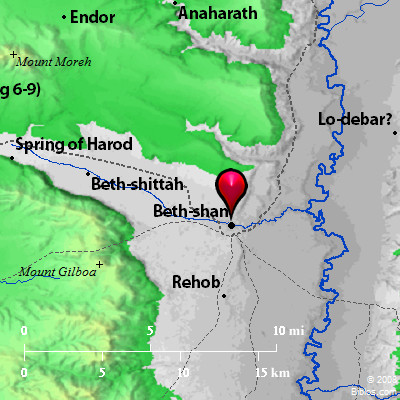Atlas  Beth-shan and surrounding area Maps Created using Biblemapper 3.0 Additional data from OpenBible.info Occurrences Joshua 17:11 Manasseh had three heights in Issachar, in Asher Beth Shean and its towns, and Ibleam and its towns, and the inhabitants of Dor and its towns, and the inhabitants of Endor and its towns, and the inhabitants of Taanach and its towns, and the inhabitants of Megiddo and its towns.Joshua 17:16 The children of Joseph said, "The hill country is not enough for us. All the Canaanites who dwell in the land of the valley have chariots of iron, both those who are in Beth Shean and its towns, and those who are in the valley of Jezreel." Judges 1:27 Manasseh did not drive out the inhabitants of Beth Shean and its towns, nor of Taanach and its towns, nor the inhabitants of Dor and its towns, nor the inhabitants of Ibleam and its towns, nor the inhabitants of Megiddo and its towns; but the Canaanites would dwell in that land. 1 Samuel 31:10 They put his armor in the house of the Ashtaroth; and they fastened his body to the wall of Beth Shan. 1 Samuel 31:12 all the valiant men arose, and went all night, and took the body of Saul and the bodies of his sons from the wall of Beth Shan; and they came to Jabesh, and burnt them there. 2 Samuel 21:12 David went and took the bones of Saul and the bones of Jonathan his son from the men of Jabesh Gilead, who had stolen them from the street of Beth Shan, where the Philistines had hanged them, in the day that the Philistines killed Saul in Gilboa; 1 Kings 4:12 Baana the son of Ahilud, in Taanach and Megiddo, and all Beth Shean which is beside Zarethan, beneath Jezreel, from Beth Shean to Abel Meholah, as far as beyond Jokmeam; 1 Chronicles 7:29 and by the borders of the children of Manasseh, Beth Shean and its towns, Taanach and its towns, Megiddo and its towns, Dor and its towns. In these lived the children of Joseph the son of Israel. Encyclopedia BETH-SHEAN; BETH-SHANbeth-she'-an, beth'-shan (beth-shan, or [beth-she'an]; in Apocrypha Baithsan or Bethsa): A city in the territory of Issachar assigned to Manasseh, out of which the Canaanites were not driven (Joshua 17:11 Judges 1:27); in the days of Israel's strength they were put to taskwork (Judges 1:28). They doubtless were in league with the Philistines who after Israel's defeat on Gilboa exposed the bodies of Saul and his sons on the wall of the city (1 Samuel 31:7), whence they were rescued by the men of Jabesh, who remembered the earlier kindness of the king (1 Samuel 31:7 2 Samuel 21:12). In 1 Kings 4:12 the name applies to the district in which the city stands. It was called Scythopolis by the Greeks. This may be connected with the invasion of Palestine by the Scythians who, according to George Syncellus, "overran Palestine and took possession of Beisan." This may be the invasion noticed by Herodotus, circa 600 B.C. (i.104-6). Here Tryphon failed in his first attempt to take Jonathan by treachery (1 Maccabees 12:40). It fell to John Hyrcanus, but was taken from the Jews by Pompey. It was rebuilt by Gabinius (Ant., XIV, v, 3), and became an important member of the league of the "ten cities" (BJ, III, ix, 7). The impiousness of the inhabitants is painted in dark colors by Josephus (Vita, 6; BJ, II, xviii, 3); and the Mishna speaks of it as a center of idol worship (`Abhodhah Zarah, i.4). Later it was the seat of a bishop. BETH-SHE'AN, or Beth-shan, a village of about 50 houses and many fine ruins about 3 ms. in circuit. Assigned to Manasseh but in the territory of Issachar Its history is given, in part, in 1 Sam. 31:10-12, but the place is mentioned elsewhere seven times. It is exactly 3 ms. from the Jordan and 15 ms. s. by w. from the sea of Galilee. Now called Beisan, formerly Scythopolis. Strong's Hebrew H1052: Beth Shean"place of quiet," a place in Manasseh, West of the Jordan |



